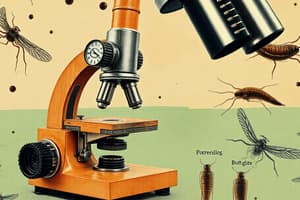Podcast
Questions and Answers
What is the proper way to hold a compound light microscope?
What is the proper way to hold a compound light microscope?
- Both hands on the stage
- One hand on the eyepiece and one on the stage
- One hand on the focus knobs
- One hand through the arm and another under the base (correct)
The coarse focus knob is used with all objective lenses.
The coarse focus knob is used with all objective lenses.
False (B)
What is the magnification range of a stereo microscope?
What is the magnification range of a stereo microscope?
10-40x
A slide is held in place on the stage using the __________.
A slide is held in place on the stage using the __________.
What kind of microscope is used to view objects at an atomic level?
What kind of microscope is used to view objects at an atomic level?
A dissecting microscope is another name for a stereo microscope.
A dissecting microscope is another name for a stereo microscope.
What type of specimens does a compound light microscope require?
What type of specimens does a compound light microscope require?
The magnification of an electron microscope ranges from __________ to __________.
The magnification of an electron microscope ranges from __________ to __________.
Match the following types of microscopes with their characteristics:
Match the following types of microscopes with their characteristics:
What is the primary function of a microscope?
What is the primary function of a microscope?
Anton Van Leeuwenhoek is known for inventing the first microscope.
Anton Van Leeuwenhoek is known for inventing the first microscope.
Name one of the three types of microscopes.
Name one of the three types of microscopes.
The __________ regulates the amount of light passing through the specimen.
The __________ regulates the amount of light passing through the specimen.
What is the highest magnification power of a compound light microscope?
What is the highest magnification power of a compound light microscope?
Resolution is a measure of the clarity of an image.
Resolution is a measure of the clarity of an image.
What does the ocular lens magnify by?
What does the ocular lens magnify by?
To calculate the total magnification, multiply the ocular lens power by the __________ power.
To calculate the total magnification, multiply the ocular lens power by the __________ power.
Match the parts of a microscope with their functions:
Match the parts of a microscope with their functions:
Who was Robert Hooke and what did he name after observing cork?
Who was Robert Hooke and what did he name after observing cork?
Flashcards
What is a microscope and what is it used for?
What is a microscope and what is it used for?
A specialized tool used in biology to enlarge the view of tiny objects that are invisible to the naked eye.
Who was Robert Hooke and what was he known for?
Who was Robert Hooke and what was he known for?
He was a scientist who used a rudimentary microscope to observe a thin slice of cork. He discovered tiny compartments within the cork, which he named "cells."
Who was Anton Van Leeuwenhoek and what was he known for?
Who was Anton Van Leeuwenhoek and what was he known for?
He's known as the "Father of Microscopy." He built over 240 microscopes and was the first to observe and describe microscopic organisms in pond water, which he called "tiny animalcules."
What is magnification?
What is magnification?
Signup and view all the flashcards
What is resolution?
What is resolution?
Signup and view all the flashcards
What is a compound light microscope used for?
What is a compound light microscope used for?
Signup and view all the flashcards
What is the magnification of a compound light microscope?
What is the magnification of a compound light microscope?
Signup and view all the flashcards
What is the magnification of the ocular lens? (eyepiece)
What is the magnification of the ocular lens? (eyepiece)
Signup and view all the flashcards
What are the magnifications of the objective lenses on a compound light microscope?
What are the magnifications of the objective lenses on a compound light microscope?
Signup and view all the flashcards
How do you calculate the total magnification for each lens on a compound light microscope?
How do you calculate the total magnification for each lens on a compound light microscope?
Signup and view all the flashcards
Aperture
Aperture
Signup and view all the flashcards
Compound Light Microscope
Compound Light Microscope
Signup and view all the flashcards
How to hold a compound light microscope
How to hold a compound light microscope
Signup and view all the flashcards
Coarse Focus Knob
Coarse Focus Knob
Signup and view all the flashcards
Fine Focus Knob
Fine Focus Knob
Signup and view all the flashcards
Stage Clips
Stage Clips
Signup and view all the flashcards
Stereo Microscope
Stereo Microscope
Signup and view all the flashcards
Dissecting Microscope
Dissecting Microscope
Signup and view all the flashcards
Electron Microscope
Electron Microscope
Signup and view all the flashcards
Compound Light Microscope
Compound Light Microscope
Signup and view all the flashcards
Study Notes
Microscope Review
- Microscope: A tool used to magnify objects, commonly used in biology
- Robert Hooke: Observed cork using a microscope, noting tiny boxes (cells)
- Anton van Leeuwenhoek: Known as the "father of microscopy," built over 240 microscopes, observed tiny organisms
- Types of Microscopes:
- Compound Light Microscope
- Stereo Microscope
- Electron Microscope
- Magnification: A measure of how much an image is enlarged.
- Resolution: A measure of the clarity of an image
- Compound Light Microscope Function: Allows light to pass through a thin specimen using two lenses to create an image.
- Compound Light Microscope Magnification: 40x-400x
- Ocular Lens Magnification: 10x
- Objective Lens Magnification: Low (4x), Medium (10x), High (40x)
- Calculating Total Magnification: Multiply the ocular lens magnification by the objective lens magnification.
- Revolving Nosepiece: Allows changing the objective lenses.
- Stage: Holds the slide for viewing
- Diaphragm: Controls the amount of light entering the microscope
- Coarse Focus Knob: Moves the stage up and down, used for low power
- Fine Focus Knob: Moves the stage slightly for precise focus (used at all powers).
- Stage Clips: Hold the slides in place
- Stereo Microscope/Dissecting Microscope: Magnifies objects without needing thin samples, useful for studying surfaces.
- Electron Microscope Function: Uses electrons instead of light to view extremely small objects, achieves much higher magnifications than light microscopes.
- Electron Microscope Magnifications: 2000-10,000,000x
- Electron Microscope Usage: Large, expensive, generally used in hospitals, universities, etc.
- Compound Light Microscope Usage: Standard, most widely used.
Studying That Suits You
Use AI to generate personalized quizzes and flashcards to suit your learning preferences.




